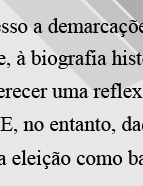

................................
1. "Leaders of the Nation". Given their Inherently plastic genre and malleability by diverse historiographical conceptions, as well as their underlying ideologies, biographies reflected well the hesitations and ambiguities that marked early-century historical writing, from the authoritarian attempts of the initial phase to the consolidation of the Estado Novo regime. The previous landscape had remained much the same. In a climate of instability, albeit with different facades, the life portrait was still the ideal vehicle for the dissemination of both new and old ideologies. Generally in a shorter format, biographies continued to multiply at the pace of political upheaval. Some years prior to the establishment of the new regime, José de Agostinho, an outstanding disseminator of Republicanism, published his "Galeria republicana" in the Biblioteca Democrática. In the year zero of the Republic, it was the turn of Rodrigo Veloso, a journalist and bibliophile and fellow student of Antero, to initiate several series (his own edition) determined by the categories in which he placed the eminent figures of his time: jurists, benefactors, bibliophiles, parliamentarians and journalists. It was only a few years later, within the context of a national regeneration and in keeping with the democratic tradition of uplifting the masses, that other collections dedicated to the men of letters and the thinking of the nation were published, such as "Os nossos escritores" ["Our Writers"] again by J. Agostinho, and "Patrícia" by the Diário de Notícias, where the journalist and bibliophile, Forjaz de Sampaio, published numerous short biographies of mainly contemporary figures. However, and contrary to the relative indefiniteness that had been observed until then, the dominant profile of the authors of these works became more distinctly that of the publicist and amateur and less that of the scholar. The former will have to be deciphered among those who found their selected material in the more distant past, as it was thus determined by the progressive delimitation of historiographical work and the status of the historian.
The precursor of this divorce – since this is what it was, to some extent, during a considerable part of the Estado Novo regime – was initially the predominantly exclusive interest that academics and other scholars dedicated to figures of the past, claiming, as historians, to be the only ones qualified to validate their versions of national history (and consequently, to judge its protagonists).
